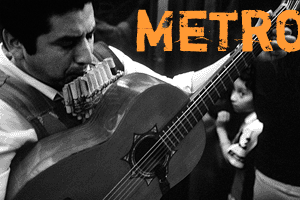We enter the metro network of Mexico City. It hosts and offers work to hundreds or even thousands of people. They sell multifunctional pens, magic chewing gums and everything up to mathematic formularies or movie DVDs. At some metro lines up to 80 musicians are playing and hanging around, without counting the karaoke singers. The metro not only serves as a public transport system for more than 4 million people daily, but also contains a whole market of unregistered work. It seems like a city beneath the city where not even a chain of vegetarian supermarkets is missing.
The sometimes unreal and lonely scenes in the metro station change to crowded and muggy places at other stations. Music interfuses the melancholic atmosphere in the train. Tired people are on their way to work or are getting back home. They are quiet, sleeping on their neighbors shoulder or are staring at the by flashing darkness at the other side of the window. The omnipresent vendors change the wagon every station. Their shouts and products change therefore every two minutes and the torture with the newest hits of the Mexican charts never end. But the prices never change:
"Diez pesos le vale, diez pesos le cuestaaa!" - The world of the ten pesos.
Seldom but unforgettable kids with clashing broken glass of broken bottles enter the train. They smash them on a cloth at the floor, crack them with their shoes and drop their naked chest or back into the glass. Dazed by drugs they do not realize that blood is running down their body while they collect money.
When musicians enter the wagon, the passengers lift their heads and offer them skeptical looks. After the first notes it is obvious that Felix knows how to play guitar and flute. His girlfriend accompanies him with voice and flute. All passengers look at them – the weariness seems to be forgotten while they are playing – some are singing with them, others are moving in the rhythm.
Vitality shines out of some shortly before tired faces. "If you're playing good, you earn good", says Ricardo who plays flute. A friend accompanies him with a "charrango" and flute.
They sell after every song self made CDs – daily 50 pieces until leisure-time. Sometimes people buy CDs with false money. The amount of false money that is sold at the market "Tepito" is that huge that it can impossibly be changed by banks. So they quickly get rid of it in the next opportunity such as kiosks. The musicians are impressively organized. Every group plays in fixed areas of the train at always the same line to prevent concurrence or stress in-between each other.
The music is the light of metro-city that trails off where invalids and old people display their selves to beg money. The ailing social system does not afford an alternative. Beside many young musicians an old man plays his saxophone. Once he was a hairdresser and enjoyed his work. With his seniority his eyes got worse daily until he gave up his shop. A friend gave him a saxophone as a present, which he is now playing in the Metro to survive. He smiles insecure and states his enjoyment of being musician beside all the endeavors of this work. Finally he brings pleasure to the passengers of the metro what affords him a simple life.

